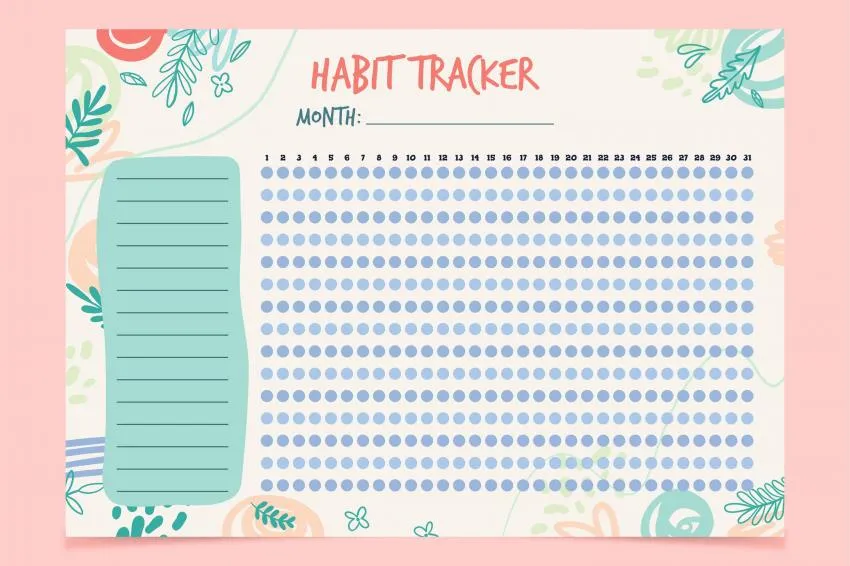Quick Tips To Build Your Daily Routine Starting Today | Best Life Hacks

Life is fluid. If you’re reading this then you’re looking for a way to build some consistency into your daily routine and maybe drop a few bad habits along the way. My biggest time suck was hours upon hours in front of the TV. I had to break that habit to start building the ones that would lead me toward my goals. I’m still a work in progress, but there are a few things I’ve picked up along the way as I work toward my #bestlife.
Here are the tips to help you build a daily routine and develop healthy habits to achieve your goals:
1. First, make a list of all the things you want to be doing, and then create a checklist distinguishing what you think is manageable on a daily, weekly, and monthly basis.
- Checklists keep you on track with the things you need to get done. Instead of trying to remember to do everything, they give you a visual reminder of what you are trying to accomplish.
- Life checklists are different from work checklists in that they serve as more of a guide rather than a hard list. Be prepared to miss checking some items off here and there as the demands of everyday life will command priority depending on the situation.
- If the unchecked items outnumber the ones you are checking off, take a moment to reassess if your checklist is actually functional. There’s only so much time in a day, and if your checklist is set up in a way that you have to constantly overextend yourself, it will lead to stress and failing to achieve long-term results.

2. Start with a few habits at a time and once you find space in your day for those, add more challenging and time-consuming practices in your daily routine.
- The mantra “go big or go home” does not apply to habit building. Starting small will put you on the path to success because it requires less of a time commitment upfront.
- The first habits you work on should be those that will take no more than 10-20 minutes each day. Making these quick adjustments to your routine will give you a sense of accomplishment and boost your confidence in taking on bigger challenges.
- Taking on too much at once will overwhelm you. To build habits that stick over the long-run, give them the time and attention they deserve in the beginning.
3. Commit to your daily habits by practicing them regularly each day.
- You have to make an effort if you want to see results. It won’t always be easy.
- Even if you just don’t have the energy to do something on a given day, at least think about it. Giving these habits the daily recognition they deserve will help you to train yourself in making them a priority.
- After a few weeks, these practices will start to feel natural and like you have been doing them all along. It took me three weeks to go from doing some kind of physical activity for however many minutes I could handle each day to hit the hour mark effortlessly. Previously, I didn’t think I had the time. Now I can’t imagine my days without it.
4. Start your days right by doing one thing when you first wake up every morning.
- Choose a simple habit, one that doesn’t require much more than getting out of bed, like washing your face, a morning stretch, or meditating.
- If one of your goals is to get fitness in first thing, try sleeping with your gym clothes on or having them folded and stacked on top of your dresser. This eliminates the need to figure out what you are going to wear thus making it easier to get up and get moving.
- Starting your day with one piece of your routine sets you up to stay on track with your goals for the rest of the day.
"Taking care of my body has been a top priority for me and not being able to get to yoga class regularly took its toll. I started by stretching right when I got out of bed in the mornings, just 20 minutes. It was a struggle at first, but now I'm stretching for almost an hour each day and I feel great. If for some reason I miss it first thing in the morning, I make it up at some point throughout the day. It's become so regular that my body can't go a day without it."
-Christina Solana of Avatara Ayurveda
5. Be willing to give up your bad habits. You know which ones I’m referring to – the ones that feel good while you’re doing them but leave you with nothing but regret.
- The key to breaking bad is habits is replacing them with good ones. Every day you are going to have to make a choice between giving in to your indulgences and putting in work to achieve something better.
- The problem with breaking bad habits is that change is hard. Instead of thinking of giving up your bad habit like a loss, think of it as evolving that habit into something you prefer.
- The struggle will be real at the onset, but with the right dedication, eventually, all the habits you are developing will make you feel so good they'll seem like an indulgence too. And maybe they are! Just a different kind of indulgence than what you’re used to.
6. Fight through the struggle of change.
- When things are hard, recognize that you have to fight through the current situation. Time does not stand still, but goals can become stagnant and possibly irrelevant if enough time passes without progress.
- Think about how you will feel after the present moment if you do something or not. Will you regret a passive approach to your goals later?
- Either you take the action or you don’t. Imagine what you’re future looks like on the current course and the potential it has if you start making changes. What is the domino effect of both of those scenarios?
7. Get someone else involved to help hold you accountable.
- Sometimes, receiving recognition is the key to success.
- Sometimes, the only reason to get things done is so you don’t have to explain why you didn’t do them in the first place.
- Find someone who will celebrate your wins with you, but who will also help you think through your misses. Ideally, that person will be working on some goals too so you can both check in with each other on progress and brainstorm adjustments when one of you isn't hitting the mark.
8. Understand that your daily routine is a work in progress.
- Sometimes even the best-laid plans go awry, change will likely be needed along the way. Something you thought should be daily might be better accomplished a few times per week. What you had placed on the back burner could be something you can’t go a day without.
- Disruptions to our routine come in many forms and it is what we do once we recognize these disruptions that can help us get back on track. Acknowledge the disruption to your routine and plan to get back to it ASAP.
- Everything that happens in our daily lives affects our daily routine. Leave wiggle room for yourself. You’re not writing your plans in stone. Think about it like writing in pencil. Erase and modify as needed.
9. Forgive yourself if you don’t get something done.
- Sooner or later you are going to fall off the wagon. It’s an inevitability. When that happens, don’t beat yourself up.
- The point of doing all this is not to make yourself feel bad. What you are working toward is something that is meant to make you feel good and it’s okay to slip up. Focus on all that you have accomplished and move on to have a better tomorrow.
- Perfection is not reality so expect yourself not to get everything done every day. Be satisfied knowing that you’re doing some of the things most of the days and eventually most of the things a lot of the days. The progress you are making can be enough.
10. Don’t’ be afraid to start over.
- If you feel like you were misguided in attempting to form a particular habit, stop doing it. If something isn’t working and you’ve given it your best effort, it could be that thing isn’t as essential to your daily life as you thought it was.
- So, you spent a while building up a routine and have no idea where you went wrong? It’s was effortless before and it seems impossible now? Stuff happens. Move on. Start fresh several days in a row if you have to.
- Any random circumstance could come along and throw life completely out of whack. All of a sudden life starts looking very different than it used to. If what you once did seems impossible, start at the beginning, just like you did before.
Building habits isn’t easy. It requires effort and commitment. To give yourself a chance at success, start small, with one habit at a time. Adjust as needed and don’t be afraid to start over if life happens to push you off track or your checklist gets too long. With enough practice and some patience, you'll be doing the things you always said you wanted to, but didn’t think you had the time for.
Before you know it, your life will look very different from the one you had been living.

Opinions and Perspectives
These principles helped me finally stick to meditation after years of trying.
Started with morning stretches as suggested. Now I actually look forward to them.
This approach to habit building feels much more sustainable than others I've tried.
Anyone else notice their energy levels improve after establishing a routine?
Been implementing these tips for a month now. My productivity has doubled.
Small time commitments add up. My 10-minute habits often naturally extend longer now.
Still skeptical about the 10-20 minute habit suggestion. Seems too short to make impact.
The article makes habit-building seem more approachable than other guides I've read.
I work rotating shifts and still maintain core habits. It's about consistency not perfection.
Interesting that it mentions physical activity but doesn't push specific workout routines.
Start even smaller then. I began with just drinking water first thing in the morning.
The tip about replacing bad habits with good ones changed my perspective entirely.
Valid point about night shifts. I adapted these tips to start my day at 6pm instead.
Missing the point about tracking progress. How do we know if we're improving?
Good luck! Remember what the article says about forgiveness if you slip up.
The article doesn't suggest giving up TV completely, just being more mindful of time spent.
Been following similar principles for 6 months. Most important lesson: consistency beats perfection.
I'm a parent of three and actually found routines more essential. They help me stay sane.
Not convinced about the accountability partner idea. Feels like added pressure.
Anyone successfully break a social media addiction using these principles?
The pencil vs stone metaphor for routine planning is brilliant. Flexibility is crucial.
Started my journey with just a 5-minute morning meditation. Six months later and my whole day is transformed.
Wish they included more specific examples of how to handle routine disruptions.
The tip about thinking through future consequences of actions vs inaction is really powerful.
My anxiety has definitely improved since I started following a morning routine. Gives structure to my day.
Anyone else notice better mental health after establishing a solid routine?
Love how the article emphasizes progress over perfection. That's so important for long-term success.
Actually, having a routine gives me more free time for spontaneous activities because I'm more efficient with necessities.
The part about assessing if your checklist is functional really helped me realize I was being too ambitious.
Yes! Weekends are my downfall too. I try to at least keep one or two key habits going even if I skip the rest.
I find it harder to maintain routines on weekends. Anyone else struggle with this?
Been trying to build better habits for years. The key really is starting small like they say.
Would love some specific examples of manageable daily vs weekly tasks to start with.
I appreciate the realistic approach here. Not everyone can maintain a perfect routine every single day.
The article makes a great point about replacing bad habits rather than just trying to stop them.
Three weeks to build a habit seems optimistic. It took me months to establish a consistent meditation practice.
You can adapt these principles to any time of day. I do my routine in the evening and it works great for me.
The TV habit part hits home. I realized I was watching 4 hours every evening instead of working on my goals.
I use checklists daily! Game changer for me. Started with just 3 items and now I manage 10 daily tasks easily.
Has anyone tried the checklist method? Would love to hear how it's working for others.
The part about forgiving yourself really resonates with me. I tend to abandon everything if I miss one day.
Not sure I agree with sleeping in gym clothes. Sounds uncomfortable and probably not great for your skin.
The accountability partner suggestion works wonders. My sister and I check in daily about our goals and it keeps us both on track.
I've been doing morning stretches for 2 weeks now and it's already becoming second nature. The article is spot on about small changes.
That's exactly why the article suggests starting small. Even 10 minutes a day can make a difference if you're consistent.
These tips make sense but honestly who has time for all this? Between work and kids I can barely keep up as is.
Love the idea of sleeping in gym clothes! I'm definitely trying that tomorrow morning.
Starting with small habits is key. I tried going all in with 5 new habits at once last month and burned out within a week.
I really needed to read this today. Been struggling with my morning routine and these tips seem practical to implement.
